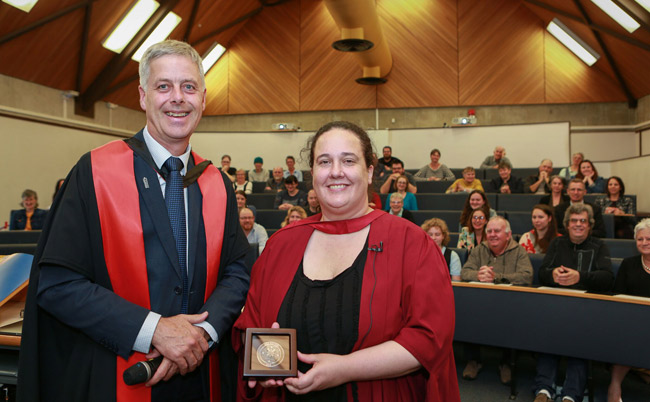
The 2018 winner of the University's Rowheath Trust Award and Carl Smith Research Medal Associate Professor Siân Halcrow of Anatomy (right) with Deputy Vice-Chancellor (Research and Enterprise) Professor Richard Blaikie at an event to celebrate the award this month. Photo: Sharron Bennett.
This year's winner of the University's Rowheath Trust Award and Carl Smith Research Medal, Associate Professor Siân Halcrow, says she was drawn into her research area through her experience as a third-year student taking Biological Anthropology at Otago.
The Carl Smith Medal is awarded annually to recognise the outstanding scholarly achievement of researchers in the early stages of their career.
Associate Professor Halcrow is an internationally renowned academic in the field of childhood bioarchaeology. Her research is concerned with the study of infant and childhood health and disease in prehistoric Southeast Asia and South America. She considers central archaeological questions of the intensification of agriculture and human responses to this seminal time in prehistory.
"The University has been very supportive of my research through internal funding and the amazing research support it provides in general."
“Studying this past transition can inform on some major issues for humanity today,” she explains. “Almost half the world's population today live in poverty, and in crowded and insanitary living conditions, which has its ultimate beginnings during the population transition with the adoption of agriculture. I look mostly at infants and children as they are very sensitive barometers of population health and disease.”
Associate Professor Halcrow manages the skeletal analysis and supervision of archaeological projects in Thailand, Laos, Cambodia, China and Chile, from her position in the Department of Anatomy. She has been published in international journals and books more than 70 times.
She says it was a huge honour to have her research team recognised with this award, which was presented to her at a special event at the Richardson Moot Court in the Richardson Building earlier this month by Deputy Vice-Chancellor (Research and Enterprise) Professor Richard Blaikie.
“The University has been very supportive of my research through internal funding and the amazing research support it provides in general.”
Otago and its staff have helped drive her passion in her field right from the beginning, she says.
"It is also very common to have imposter syndrome, but you are the expert in your chosen field, so you are here for a reason! You also don't have to say yes to everything..."
“The support and working with the resources (especially the Department of Anatomy Museum) really sparked my interest. Then for my 4th year in my BA (Hons) degree AP Nancy Tayles took me under her wing and introduced me to bioarchaeology in Thailand. I was able to work on a skeletal collection formerly housed in the Department for my honour's dissertation, and also take part on excavations in Thailand and work on collections there for my PhD.”
She has plenty of advice for other early career researchers at Otago – which includes trying to get a really good mentor and asking people for help.
“It is also very common to have imposter syndrome, but you are the expert in your chosen field, so you are here for a reason! You also don't have to say yes to everything, choose the opportunities that you see will work for you and your team. People have varying opinions on the use of social media for research. The use of social media through a popular blog, Twitter and Facbook has been very helpful in supporting my research trajectory in many ways.”
Associate Professor Halcrow delivered a lecture about her research as part of the medal presentation: “Children as canaries in the coal mine: Modelling social and environmental change in prehistory.”
The late Sir Carl Smith was a prominent Dunedin businessman and member of the University of Otago Council who set up the Rowheath Trust to support the University's work. The medal is accompanied by a $5,000 grant for personal scholarly development.
Past recipients include Dr Kourken Michaelian (Philosophy) in 2017, Associate Professor Jessica Palmer (Law) and Associate Professor Suetonia Palmer (Medicine, Christchurch) in 2015, Dr Jacob Edmond (English and Literature) in 2012 and Dr Peter Dearden (Biochemistry) in 2007.
